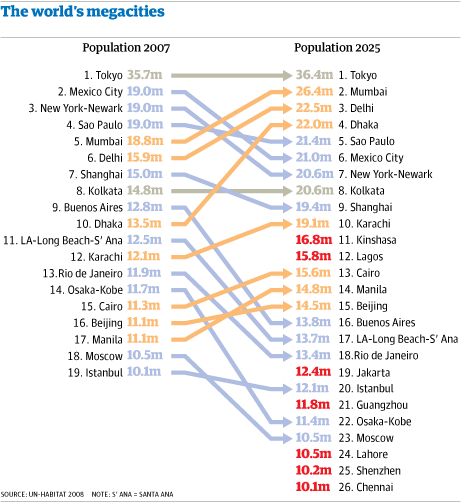 UK Guardian | Growing inequality in US cities could lead to widespread social unrest and increased mortality, says a new United Nations report on the urban environment.
UK Guardian | Growing inequality in US cities could lead to widespread social unrest and increased mortality, says a new United Nations report on the urban environment.In a survey of 120 major cities, New York was found to be the ninth most unequal in the world and Atlanta, New Orleans, Washington, and Miami had similar inequality levels to those of Nairobi, Kenya Abidjan and Ivory Coast. Many were above an internationally recognised acceptable "alert" line used to warn governments.
"High levels of inequality can lead to negative social, economic and political consequences that have a destabilising effect on societies," said the report. "[They] create social and political fractures that can develop into social unrest and insecurity."
According to the annual State of the World's cities report from UN-Habitat, race is one of the most important factors determining levels of inequality in the US and Canada.
"In western New York state nearly 40% of the black, Hispanic and mixed-race households earned less than $15,000 compared with 15% of white households. The life expectancy of African-Americans in the US is about the same as that of people living in China and some states of India, despite the fact that the US is far richer than the other two countries," it said.
Disparities of wealth were measured on the "Gini co-efficient", an internationally recognised measure usually only applied to the wealth of countries. The higher the level, the more wealth is concentrated in the hands of fewer people.
"It is clear that social tension comes from inequality. The trickle down theory [that wealth starts with the rich] has not delivered. Inequality is not good for anybody," said Anna Tibaijuka, head of UN-Habitat, in London yesterday.
The report found that India was becoming more unequal as a direct result of economic liberalisation and globalisation, and that the most unequal cities were in South Africa and Namibia and Latin America. "The cumulative effect of unequal distribution [of wealth] has been a deep and lasting division between rich and poor. Trade liberalisation did not bring about the expected benefits."


0 comments:
Post a Comment